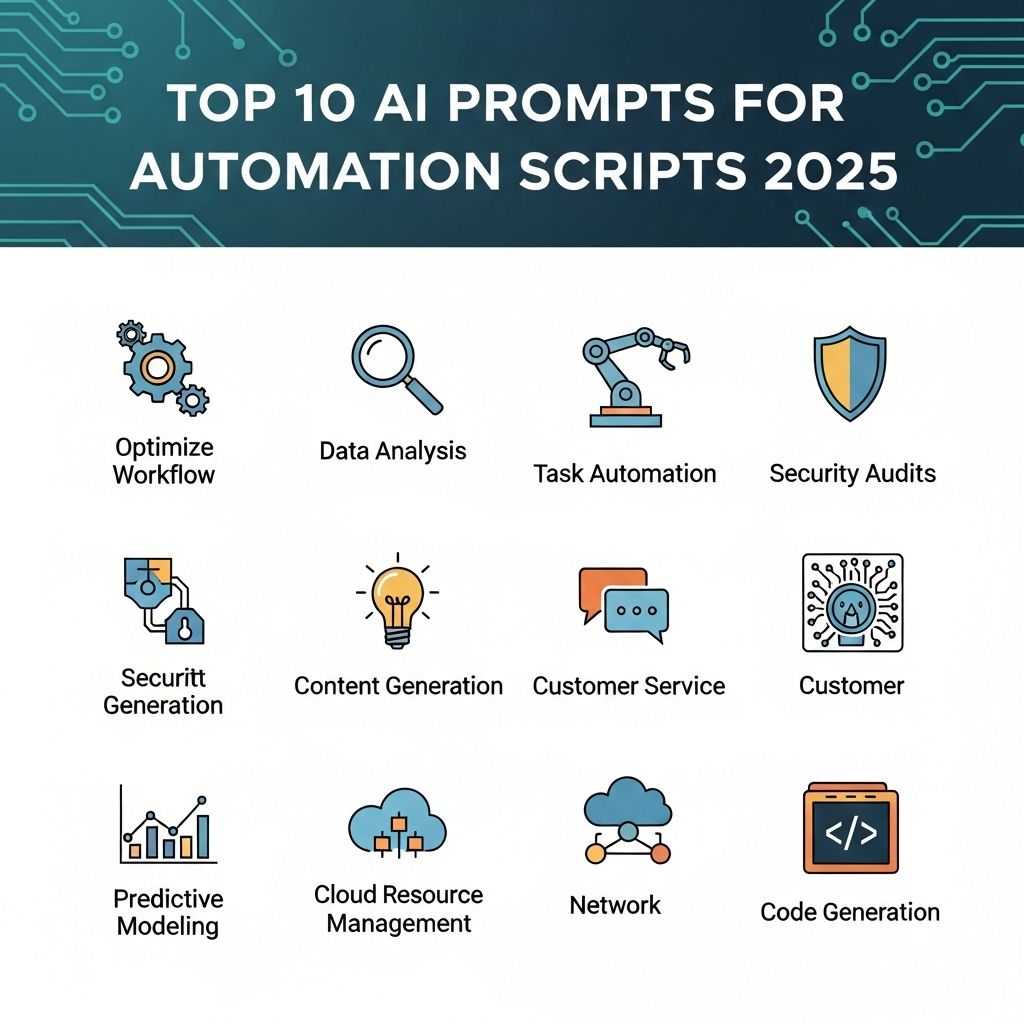In an era where automation is becoming a cornerstone of modern business operations, harnessing the power of artificial intelligence (AI) can significantly enhance efficiency and productivity. As we look ahead to 2025, the rise of sophisticated AI models enables developers and tech enthusiasts to create smarter automation scripts that can streamline processes, reduce human error, and save time.
Understanding Automation Scripts
Automation scripts are sets of instructions executed by software to automate repetitive tasks. They can be simple commands to complex workflows that integrate various applications and systems. Here are the key advantages of using automation scripts:
- Efficiency: Automating mundane tasks allows employees to focus on higher-value activities.
- Consistency: Automation reduces variability, ensuring that tasks are completed the same way every time.
- Cost Saving: By minimizing human intervention, companies can save on labor costs.
- Scalability: Automation makes it easier to scale operations without a proportional increase in resources.
Why Use AI for Automation?
Integrating AI into automation scripts can significantly boost their capabilities. Here are some reasons to consider:
- Predictive Analytics: AI can analyze historical data to predict outcomes, making scripts more effective.
- Natural Language Processing: AI can interpret and respond to human language, allowing for more intuitive automation.
- Machine Learning: Automation scripts can improve over time as they learn from data and user interactions.
Top 10 AI Prompts for Automation Scripts in 2025
As we gear up for 2025, here are ten AI prompts that can be game-changers for developing automation scripts:
1. Data Processing and Reporting
Prompt: “Analyze the sales data from the last quarter and generate a detailed report highlighting trends and anomalies.”
This prompt can be utilized to automate data extraction from various sources and produce comprehensive analytics reports.
2. Customer Support Automation
Prompt: “Create a chatbot that can handle FAQs and escalate complex queries to human agents.”
Use this prompt to build an intelligent customer support system that efficiently manages user inquiries.
3. Social Media Management
Prompt: “Schedule and post content across all platforms, optimizing for engagement based on previous posts.”
This prompt leverages AI to determine optimal posting times and content types for improved audience engagement.
4. Predictive Maintenance
Prompt: “Monitor equipment performance and predict when maintenance should be scheduled to prevent downtime.”
Utilize AI to analyze machinery data, optimizing maintenance schedules and reducing unexpected failures.
5. Personalized Marketing Campaigns
Prompt: “Analyze customer behavior and create personalized email marketing campaigns based on individual preferences.”
This can enhance customer engagement and improve conversion rates through targeted marketing efforts.
6. IT Security Automation
Prompt: “Monitor network traffic and automatically respond to potential threats in real-time.”
This AI-driven response can protect systems from cyber threats while minimizing manual oversight.
7. Document Management
Prompt: “Scan and categorize incoming documents, extracting key information for database entry.”
This can streamline document processing, making it easier to manage records and retrieve information.
8. Workflow Optimization
Prompt: “Analyze current workflows and suggest improvements for efficiency based on historical performance data.”
AI can identify bottlenecks and recommend solutions, enhancing overall productivity.
9. Recruitment Automation
Prompt: “Screen resumes and shortlist candidates based on predefined criteria for a job opening.”
This can significantly reduce the time spent on initial candidate evaluation and improve hiring outcomes.
10. Inventory Management
Prompt: “Monitor inventory levels and automatically generate purchase orders when stock falls below a certain threshold.”
Use AI to maintain optimal inventory levels, reducing costs associated with overstocking or stockouts.
Best Practices for Implementing AI in Automation
To ensure successful implementation of AI-driven automation scripts, consider the following best practices:
- Define Clear Objectives: Start with a clear understanding of what you want to achieve with automation.
- Test and Iterate: Continuously test and refine automation scripts based on performance and feedback.
- Integrate with Existing Systems: Ensure that your AI scripts can smoothly integrate with your current software and workflows.
- Train Staff: Provide training to employees on how to work alongside AI systems to maximize effectiveness.
Conclusion
As we move towards 2025, the potential of AI in enhancing automation scripts is immense. By leveraging the prompts discussed above, organizations can streamline operations, improve efficiency, and ultimately drive growth. Embracing these technologies not only positions businesses favorably in a competitive landscape but also fosters innovation and adaptability in an ever-evolving digital world.
FAQ
What are AI prompts for automation scripts?
AI prompts for automation scripts are predefined inputs or commands that guide artificial intelligence systems to perform specific tasks or automate processes efficiently.
How can AI prompts improve automation in 2025?
In 2025, AI prompts can enhance automation by allowing for more intuitive interactions, reducing the need for complex coding, and enabling faster script generation tailored to user needs.
What are some examples of popular AI prompts for automation?
Popular AI prompts for automation include ‘Generate a report based on data’, ‘Schedule social media posts’, and ‘Automate email responses based on customer inquiries’.
Can AI prompts be customized for specific industries?
Yes, AI prompts can be tailored to fit the needs of specific industries, such as finance, healthcare, and marketing, improving their relevance and effectiveness.
What tools can I use to create AI prompts for automation scripts?
Tools like OpenAI, Google Cloud AI, and Microsoft Azure provide platforms for creating and managing AI prompts for automation scripts.
Are AI prompts easy to use for beginners?
Yes, many AI prompt tools are designed to be user-friendly, allowing beginners to create effective automation scripts without extensive programming knowledge.




